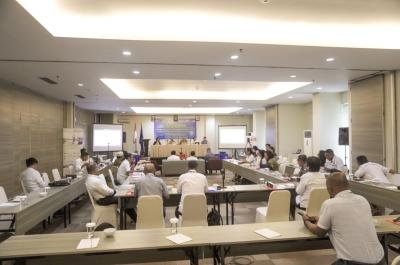
The New Zealand-Maluku Access to Renewable Energy Support (NZMATES) programme, together with Ambon State Polytechnic, held a Focus Group Discussion (FGD) titled "Shaping the Future by Preparing Vocational Human Resources for Sustainable Renewable Energy Development in Maluku Province" on Monday, 20 November 2023. The theme highlights three important aspects: the future, vocational human resources, and sustainable renewable energy. These issues are highly significant and relevant today, as environmental concerns and the energy crisis continue to draw global attention. This is a key focus for Ambon State Polytechnic (Polnam). Additionally, wars and political issues exacerbate the current situation by causing instability in conventional energy prices, despite conventional energy sources remaining the primary commodity for meeting national energy needs.
The Director of Polnam, Dady Mairuhu, stated that Renewable Energy (RE) is now a solution to address the energy crisis. Polnam is currently formulating plans to establish a Renewable Energy Programme, which is a response to alleviate the energy crisis.
"To move towards the Renewable Energy programme, the team of lecturers and students has already begun various efforts such as research and community service. For example, we are currently preparing equipment/instruments that utilize Renewable Energy. If we receive strong support from donors, the Renewable Energy program can be implemented through cross-sector collaboration," said Dady
In the FGD attended by various sectors, such as the Energy and Mineral Resources Agency (Dinas ESDM), the Regional Development Planning Agency (Bappeda) of Maluku Province, and the State Electricity Company (PLN) for Maluku and North Maluku, the discussion continued on Polnam's 2020-2024 strategic plan responding to the challenges of the energy crisis by opening a Renewable Energy programme. This aims to produce vocational human resources capable of creating and utilizing RE resources, not only human resources but also technology and services. The goal is to encourage synergy among the government, academia, and the private sector.
The support from NZMATES through this FGD facilitates the exchange of information, knowledge, and the latest news on technology, projects, and innovations related to RE in Indonesia, specifically in Maluku. It encourages in-depth discussions and analyses of challenges, opportunities, and trends in adopting RE and ways to overcome potential obstacles. NZMATES also serves as a platform to share knowledge with the general public about the benefits of renewable energy, steps towards sustainability, and how individuals can contribute. Additionally, NZMATES serves as a space for discussions on education and public awareness campaigns regarding the importance of renewable energy and reducing carbon footprint.
Head of the Energy and Natural Resources Department at Dinas ESDM, Said Latupono, in his presentation, discussed the potential and challenges of developing RE in the Maluku Province. He explained the challenges faced in the field, such as the issues with Solar Power Plants (PLTS) from the Ministry of Energy and Mineral Resources, which are still facing problems to date.
"The target for 2050 is a renewable energy mix of around 42%, fossil fuels 0%, and the rest filled by gas. In the future, PLN might use gas as a power source because it is a potential resource in the region," said Said.
Representing Bappeda, the Head of Economics and Natural Resources (EKOSDA) Junus Matakena, conveyed a presentation that primarily addressed the urgency of the energy transformation. Junus explained that there are still obstacles in the RE sector in low-carbon development efforts.
"Until now, the local government continues to raise this issue in the national development plan, hoping that the new regime will reconsider this plan. PLN has already calculated that this is sufficient to meet the needs of the port and industries in the surrounding area," said Junus.
The General Manager of PLN UIW MMU Awat Tuhuloula, in his presentation, discussed the progress of electrification and the projection of electricity needs until 2045 in the Maluku Province. From an industrial perspective, many investors have applied to build renewable energy generation plants for industrial uses, but they are unable to provide information such as Commercial Operation Date (COD), which is required for PLN to include such projects in their Electricity Supply Business Plan (RUPTL) and Electricity Procurement Plan (RKN).
"The current focus of PLN MMU is to electrify first and then deal with Environmental Impact Assessment (AMDAL), investors, and so on," said Awat.
The Programme Manager of NZMATES, Safitri Y. Baharuddin, stated that during NZMATES' presence in the Maluku Province, there is still a need to enhance the capacity of human resources and the sustainability of RE.
"One consideration could be lowering the LCOE, and of course, collaboration from all parties will support this. In the future, NZMATES also aims to encourage the establishment of the Maluku Energy Forum to discuss Renewable Energy agendas," Safitri concluded.
From the FGD that lasted approximately two hours, it is evident that the process for opening the RE program at Ambon State Polytechnic is still in the planning stage. This is also in line with the availability of industrial needs that will only become apparent in 2025 and beyond. So far, with the support of NZMATES, Polnam has prepared a comprehensive plan related to the availability of permanent lecturers, especially for RE, which can be implemented in the budget year 2024-2025. The procurement of RE practical laboratories, especially for PLTS and Micro-hydro, is also underway. In addition, the procurement of a wind energy laboratory still requires special planning because it needs open land as a natural laboratory. Also, the curriculum is still under development and will receive input from industry and practitioners.
